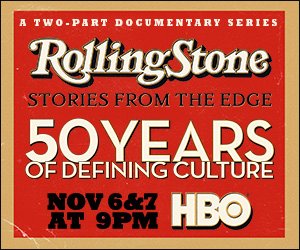Rolling Stone : Stories from the Edge
Rolling Stone : Stories from the Edge is a 4-hour, 2-part documentary from HBO about Rolling Stone Magazine. It tells the story from the magazine’s start in 60’s San Francisco and runs through the most recent US Presidential election.

I remember liking RS in high school (which was the mid-late-80’s ). My folks weren’t Rolling Stone people but I have a friend whose parents were and I usually read it when I was at his house.
There was a lot for me to enjoy in this documentary:
The nostalgia of 60’s San Francisco is a well-trod path, but the John Lennon bits were interesting since I just came off of that massive Bob Spitz Beatles biography.
Hunter S Thompson is someone I’ve always known as the “gonzo journalism” guy, but I didn’t realize all of that was done under the Rolling Stone banner. These are crazy stories. Hearing the now is like hearing someone tell stories about all of the parties they “got supppper fucked up and trashed the Denny’s” Except in this case, the Denny’s is the Democratic National Convention.
I actually remember some of the magazine’s coverage of the Reagan years and new wave music, but none of their 90’s boy band writing. Thank goodness. That was the height of ‘zine culture for me and I was way more into reading The Big Takeover than the bullshit dinosaur Rolling Stone. Turns out I missed some great writing.
Ice-T and the “Cop Killer” controversy also gets a deeper look. This is something I remember well so it is cool to hear Ice-T talk about it now.
The UVa rape case was a huge editorial failure on the part of RS and the interview with the publisher and the article author are really well done.
A lot of it was also a handjob to Baby Boomers. I get frustrated at the way a whole generation will take credit for simply being alive when large cultural shifts happened. You know how that Dr. Dre and Jimmy Iovine show sure did a great job of telling us how important Dr, Dre and Jimmy Iovene were? This RS thing is kind of like that. Yes, the magazine had an effect on culture, but it’s silly to suggest that it was a driving force of the culture.
